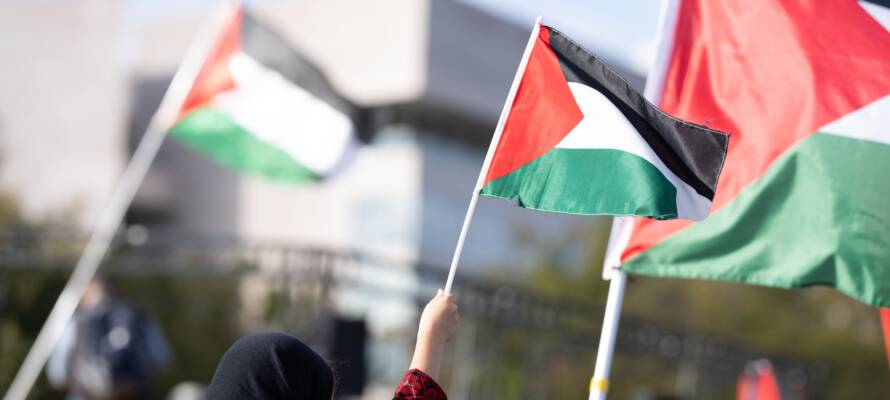The group says the proposal ‘threatens the free speech and assembly rights of community members who peacefully advocate on behalf of Palestinian rights.’
By Corey Walker, The Algemeiner
The Council on American-Islamic Relations (CAIR) has submitted a complaint against the Los Angeles City Council over a proposal to ban anti-Israel protesters from demonstrating in front of synagogues.
CAIR, which has been dogged for years by allegations of association with Hamas and other terrorist groups, argues that establishing “100-foot protest buffer zones” around “sensitive sites” such as Jewish institutions and houses of worship could hamper speech rights of anti-Israel activists. The organization stated that the proposal represents the latest in a series of attempts to unfairly target so-called “anti-genocide” protesters.
“Though the goal of the motion is to protect public spaces, such as religious institutions and healthcare facilities from those who may block or impede the entrances to these facilities, it is important to examine the underlying context, which directly threatens the free speech and assembly rights of community members who peacefully advocate on behalf of Palestinian rights,” the organization wrote.
JUST IN: CAIR has come out against two LA city council proposals that would, among other things, require pro-Hamas protestors to keep an 8-foot distance from people entering synagogues and prohibit them from intentionally blocking entrances pic.twitter.com/P6A7S32PwQ
— Eitan Fischberger (@EFischberger) September 15, 2024
CAIR slammed the proposed rules as “arbitrary” and “impractical,” adding that they are likely to result in the “unjust criminalization of individuals who are peacefully assembling.” The organization pointed to the recent anti-Israel demonstrations at UCLA and in front of a Los Angeles synagogue as instances in which “peaceful protestors were subject to extreme violence and intimidation.”
Police violence against anti-Israel protests could increase as a result of the measure, the group warns. The organization worries that “excessive force” could be deployed against anti-Israel agitators while “pro-Zionist demonstrators” are allowed to “act with impunity.”
“We respectfully urge you to reconsider the harmful implications of this motion and to protect the fundamental rights that underpin our democracy. The right to protest and voice dissent, even on the most controversial of subjects, is a right that cannot be restricted without serious consideration of the constitutional violations that are sure to follow. Moreover, protests serve a critical function in a democratic society. They ensure that individuals can challenge the status quo and call for justice, especially on matters that disproportionately affect those systemically marginalized and dispossessed,” the group continued.
In August, the Los Angeles City Council proposed making it a misdemeanor for protesters to prevent entry into schools, religious institutions, or hospitals. The motion came amid simmering anger over violent anti-Israel demonstrations across the city. Pro-Palestine protesters swarmed Adas Torah synagogue in June to prevent a real estate auction of Israeli land.
“Even here in Los Angeles County, we have seen how intimidation is used to prevent community members from entering facilities to receive essential services,” Los Angeles Supervisor Lindsey Horvath said in a statement.
A number of Jewish advocacy organizations and leaders expressed support for the proposal, claiming that that it will “ensure the safety” of those trying to enter religious institutions.
CAIR has long been a controversial organization. In the 2000s, it was named as an unindicted co-conspirator in the Holy Land Foundation terrorism financing case. Politico noted in 2010 that “US District Court Judge Jorge Solis found that the government presented ‘ample evidence to establish the association’” of CAIR with Hamas.
According to the Anti-Defamation League (ADL), “some of CAIR’s current leadership had early connections with organizations that are or were affiliated with Hamas.” CAIR has disputed the accuracy of the ADL’s claim and asserted that CAIR “unequivocally condemn[s] all acts of terrorism, whether carried out by al-Qa’ida, the Real IRA, FARC, Hamas, ETA, or any other group designated by the US Department of State as a ‘Foreign Terrorist Organization.’”
CAIR has found themselves been embroiled in even more controversy since Oct. 7. The head of CAIR, for example, said he was “happy” to witness Hamas’ rampage across southern Israel.
“The people of Gaza only decided to break the siege — the walls of the concentration camp — on Oct. 7,” CAIR co-founder and executive director Nihad Awad said in a speech during the American Muslims for Palestine convention in Chicago in November. “And yes, I was happy to see people breaking the siege and throwing down the shackles of their own land, and walk free into their land, which they were not allowed to walk in.”
